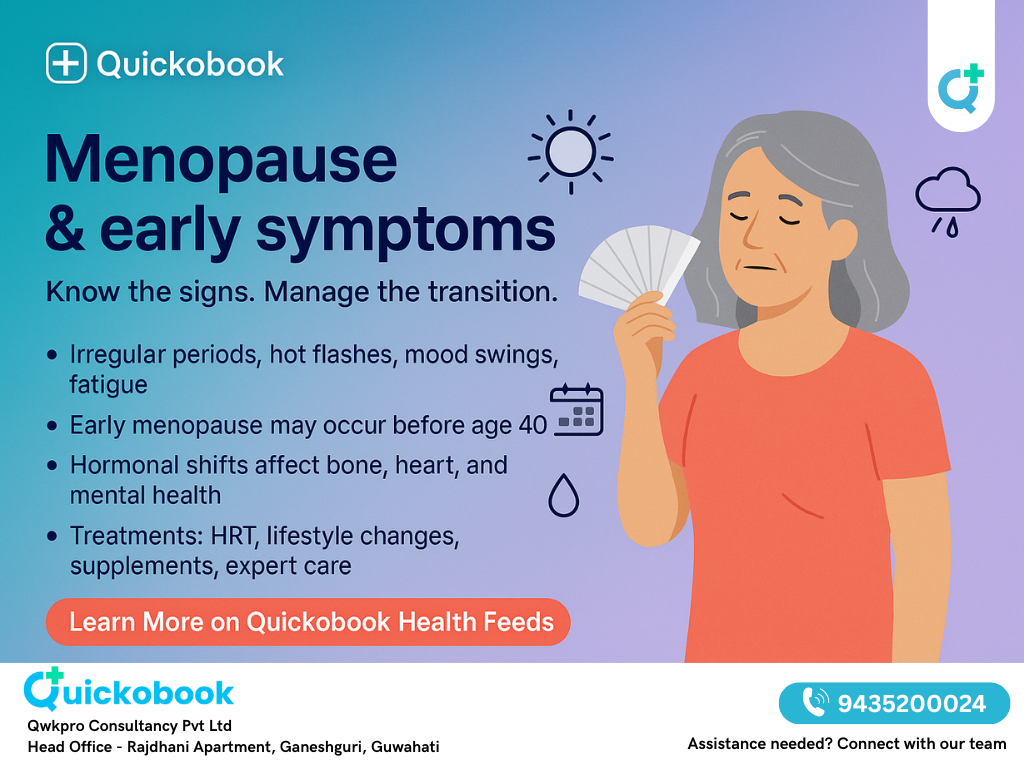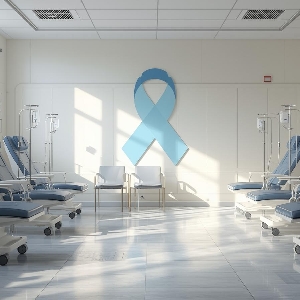Introduction
Menopause is a natural phase in every woman’s life, marking the end of her menstrual cycles. It usually occurs between the ages of 45 and 55 but can happen earlier in some cases, known as early menopause. For Indian women, the average age of menopause is around 46–47 years. While menopause is a normal transition, the symptoms can sometimes affect daily life. Understanding these changes helps women take timely steps toward better health. Consulting a gynecologist or booking tests through Quickobook can ensure proper care.
What is Menopause?
Menopause is defined as the stage when a woman has not had a menstrual period for 12 consecutive months. It happens because the ovaries stop producing hormones like estrogen and progesterone.
Types of Menopause
- Natural Menopause: Occurs gradually with age.
- Early Menopause: Happens before age 40.
- Premature Ovarian Insufficiency (POI): When ovaries stop working earlier than expected.
- Surgical Menopause: Caused by removal of ovaries.
Causes of Menopause and Early Menopause
- Age-related decline in reproductive hormones.
- Genetics (family history of early menopause).
- Autoimmune conditions (thyroid disorders, rheumatoid arthritis).
- Surgical removal of ovaries.
- Cancer treatments like chemotherapy or radiation.
- Lifestyle factors such as smoking, malnutrition, or stress.
Common Symptoms of Menopause
- Hot flashes
- Night sweats
- Irregular periods
- Mood swings
- Sleep disturbances
- Vaginal dryness
- Decreased libido
- Weight gain, especially around the abdomen
- Thinning hair and dry skin
- Memory and concentration issues
Early Menopause Symptoms
- Periods stop before age 40
- Infertility concerns
- Higher risk of osteoporosis
- Anxiety and depression due to hormonal imbalance
Diagnosis of Menopause
A gynecologist may recommend:
- Medical history and symptom review
- Blood tests:
- Follicle Stimulating Hormone (FSH)
- Estradiol (E2)
- Thyroid function tests (to rule out thyroid issues)
- Bone density scan (for osteoporosis risk)
???? You can easily book menopause-related tests and gynecologist consultations on Quickobook.
Treatment Options
Medical Treatments
- Hormone Replacement Therapy (HRT): Balances estrogen and progesterone.
- Non-hormonal medications: For hot flashes and mood swings.
- Calcium & Vitamin D supplements: For bone health.
Lifestyle Management
- Eat a balanced diet rich in calcium, iron, and vitamins.
- Exercise regularly (walking, yoga, strength training).
- Practice stress management (meditation, deep breathing).
- Stay hydrated and avoid spicy food, alcohol, and smoking.
Natural Remedies
- Herbal teas (soy, flaxseed, black cohosh – only after doctor’s advice).
- Ayurvedic lifestyle practices.
Prevention & Lifestyle Tips
- Regular gynecologist check-ups.
- Early screening for osteoporosis, diabetes, and heart disease.
- Healthy diet and exercise.
- Quit smoking and limit alcohol.
- Maintain a healthy body weight.
Risks and Complications of Menopause
- Osteoporosis (bone weakness)
- Heart disease
- Depression and anxiety
- Urinary incontinence
- Reduced sexual health
When to See a Gynecologist
Seek medical help if you experience:
- Periods stopping before age 40
- Very heavy or irregular bleeding
- Severe hot flashes and sleep disturbances
- Persistent mood changes
- Pain during intercourse due to vaginal dryness
???? Book a gynecologist consultation today on Quickobook for expert advice and tests.
Conclusion
Menopause is a natural transition but can bring physical and emotional challenges. Early menopause may increase health risks and requires timely medical attention. With lifestyle modifications, medical support, and regular check-ups, women can manage symptoms effectively and maintain overall well-being. Remember, Quickobook makes it easy to book gynecologist consultations and necessary tests from the comfort of your home.
READ ALSO: How Safe Sex Starts With Smart Decisions: Complete Guide
50 Frequently Asked Questions (FAQs)
Q1. At what age does menopause usually occur in Indian women?
A: Around 46–47 years on average in India.
Q2. What is early menopause?
A: Menopause that happens before the age of 40.
Q3. What are the first signs of menopause?
A: Irregular periods, hot flashes, and mood swings.
Q4. Can stress cause early menopause?
A: Chronic stress may worsen hormonal imbalance but is not the only cause.
Q5. Is early menopause genetic?
A: Yes, family history can increase the risk.
Q6. How long do menopause symptoms last?
A: Symptoms may last 4–8 years but vary for each woman.
Q7. Can pregnancy happen during perimenopause?
A: Yes, until periods completely stop, pregnancy is possible.
Q8. Do I need to see a gynecologist for menopause?
A: Yes, regular check-ups help manage symptoms and prevent complications.
Q9. Is hormone replacement therapy safe?
A: It may be safe for some women under medical supervision.
Q10. What foods help with menopause symptoms?
A: Soy, flaxseed, green leafy vegetables, dairy, and whole grains.
Q11. Can menopause cause weight gain?
A: Yes, hormonal changes can slow metabolism.
Q12. How does menopause affect sleep?
A: Hot flashes and hormonal imbalance may disturb sleep.
Q13. Can yoga help with menopause?
A: Yes, yoga reduces stress and improves hormonal balance.
Q14. Is early menopause linked to osteoporosis?
A: Yes, it increases the risk of weak bones.
Q15. Can menopause cause depression?
A: Yes, hormonal changes may trigger mood disorders.
Q16. What tests confirm menopause?
A: FSH, estradiol, and thyroid function tests.
Q17. Can Ayurveda help menopause?
A: Yes, with lifestyle and herbal support, but always consult a doctor.
Q18. Is vaginal dryness normal in menopause?
A: Yes, due to reduced estrogen levels.
Q19. Can menopause cause heart problems?
A: Yes, estrogen decline increases heart disease risk.
Q20. How to manage hot flashes naturally?
A: Avoid spicy foods, caffeine, and wear light clothing.
Q21. Is early menopause reversible?
A: No, but symptoms can be managed.
Q22. Does smoking affect menopause?
A: Yes, it can cause earlier menopause.
Q23. How can I prevent early menopause?
A: Healthy lifestyle and avoiding smoking can help.
Q24. Can menopause cause memory loss?
A: Yes, some women report memory and concentration issues.
Q25. Does menopause affect fertility?
A: Yes, it marks the end of fertility.
Q26. Can menopause cause joint pain?
A: Yes, due to hormonal changes and bone health issues.
Q27. Is hormone therapy expensive in India?
A: Costs vary, ranging from INR 2,000–5,000 per month.
Q28. Can menopause cause urinary incontinence?
A: Yes, due to weakened pelvic muscles.
Q29. Does menopause increase diabetes risk?
A: Yes, due to changes in metabolism.
Q30. Can herbal teas reduce menopause symptoms?
A: Yes, some may help but consult your doctor first.
Q31. Is breast pain common during menopause?
A: Yes, some women experience breast tenderness.
Q32. Can menopause affect skin health?
A: Yes, it may cause dryness and wrinkles.
Q33. What role does diet play in menopause?
A: Balanced diet reduces severity of symptoms.
Q34. Can women still get periods after menopause?
A: No, if bleeding occurs, see a doctor immediately.
Q35. Does menopause cause hair fall?
A: Yes, hormonal changes can lead to thinning hair.
Q36. Can menopause cause headaches?
A: Yes, due to hormonal fluctuations.
Q37. How often should I see a gynecologist during menopause?
A: At least once a year or as recommended.
Q38. Can menopause be diagnosed without tests?
A: Yes, based on symptoms, but tests confirm it.
Q39. Is early menopause common in India?
A: Yes, it occurs in 1–2% of Indian women.
Q40. Can menopause cause anemia?
A: Heavy irregular bleeding may cause anemia.
Q41. How to cope with mood swings during menopause?
A: Exercise, meditation, and medical advice help.
Q42. Can menopause cause thyroid issues?
A: Thyroid issues can mimic menopause symptoms.
Q43. Do I need calcium supplements after menopause?
A: Yes, if dietary intake is low.
Q44. Can menopause cause chest pain?
A: Yes, but always rule out heart disease.
Q45. Is IVF possible in early menopause?
A: Yes, with donor eggs in some cases.
Q46. Does menopause affect immunity?
A: Yes, reduced estrogen may lower immunity.
Q47. How to prevent osteoporosis in menopause?
A: Calcium, vitamin D, exercise, and doctor’s advice.
Q48. Is hormone therapy lifelong?
A: No, it is usually short-term under supervision.
Q49. Can menopause cause nausea?
A: Some women experience digestive discomfort.
Q50. Can Quickobook help me book menopause tests?
A: Yes, you can book tests and gynecologist consultations easily.
Quickobook CTAs
- Book your menopause tests online with Quickobook.
- Consult a gynecologist near you via Quickobook.
- Get health reminders and reports directly in your Quickobook account.
Disclaimer
This blog is for educational purposes only. It does not replace medical advice. Please consult a qualified gynecologist before starting any treatment.









Comments (0)
No comments yet. Be the first to share your thoughts!
Leave a Comment